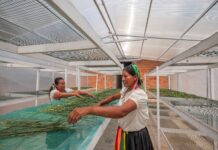In a major move to expand into the Kenyan market, De Heus, a Dutch animal feed company is investing in a state‑of‑the‑art feed mill in Athi River, Machakos County to elevate the livestock sector and catalyze agricultural growth.
The facility, built at a cost of approximately KSh 3 billion (about USD 23 million), is set to become Kenya’s first dedicated animal feed plant, with an annual production capacity of 200,000 metric tonnes. It is scheduled to become operational in the second half of 2025.
Construction of the factory officially began during a ground‑breaking ceremony held in April 2024 in Athi River. The event was graced by Kenya’s then Principal Secretary for Livestock Development, Jonathan Mueke, Machakos County Governor Wavinya Ndeti, and De Heus leadership, reinforcing strong public‑private collaboration for Kenya’s agricultural advancement.
De Heus Kenya plans to cater to the country’s rapidly growing poultry, dairy, and swine farming sectors. By offering balanced, scientifically formulated feeds, the company aims to deliver better growth performance, improved food safety, and enhanced yields for livestock producers across the country.
A central goal of the project is to uplift local grain producers by sourcing key raw materials—such as maize, soya, and wheat—from Kenyan farmers. This local procurement commitment is expected to stabilize grain prices and enhance income opportunities for thousands of local suppliers.
The economic impact of the plant extends beyond agriculture. Once operational, it is projected to generate around 250 direct jobs and an additional 1,000 indirect jobs across agribusiness value chains—including transport, logistics, grain aggregation, retail distribution, and advisory services.
In addition to the manufacturing facility, De Heus already operates over 25 distribution outlets across Kenya, making concentrates and premix products available to farmers even before the official launch of full feed production. These outlets, together with on‑the‑farm training and advisory services, are aimed at helping smallholder and commercial farmers improve feed efficiency, disease management, and overall farm productivity.
Koen de Heus, CEO of De Heus Animal Nutrition B.V., highlighted the company’s vision: “By merging our global expertise with an understanding of Kenya’s agricultural landscape, we hope to introduce innovations and feed technologies that support food security and farmer profitability”.
Local officials welcomed the development. Principal Secretary Jonathan Mueke described the investment as a vote of confidence in Kenya’s agricultural future and expressed belief that De Heus would contribute significantly to food security and innovation in livestock nutrition.
Governor Wavinya Ndeti pledged support from Machakos County, citing the region’s strategic industrial corridor and investor‑friendly policies.
The factory is expected to begin commercial production by mid‑2025 and, by 2027, De Heus Kenya aims to expand its domestic market share—especially in the poultry feed segment—by up to 15 percent, building toward a leading position in Kenya’s animal feed industry.
As construction progresses, Kenyan livestock farmers continue to benefit from access to better-quality feed inputs through De Heus’s distribution network and advisory programs. The combined effect of job creation, increased local sourcing, and improved access to nutrition solutions signals a transformative phase for Kenya’s livestock and agricultural productivity sectors.
This investment from a Dutch multinational not only boosts supply chain resilience and regional food security but also reinforces stronger economic ties between Kenya and the Netherlands, supporting sustainable growth in a vital sector of Kenya’s economy.








